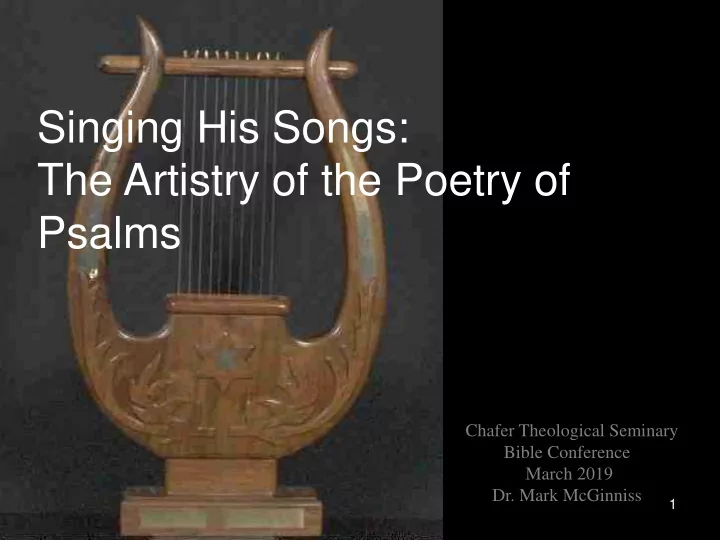

Singing His Songs: The Artistry of the Poetry of Psalms Chafer Theological Seminary Bible Conference March 2019 Dr. Mark McGinniss 1
Lament Psalms “The psalms do not simply express emotions: when sung in faith, they actually shape the emotion of the godly. The emotions are therefore not a problem to be solved but are part of the raw material of now-fallen humanity that can be shaped to good and noble ends.” 22
Lament Psalms Lament psalms “gives voice to our sorrow.” Westermann 33
Lament Psalms “The theological significance of the personal lament lies first of all in the fact that it gives voice to suffering. The lament is the language of suffering: in it, suffering is given the dignity of language.” Westermann 4
Lament Psalms “The secret of the language of the psalms lies in the fact that many people and many succeeding generations can recognize and utter it as their own prayer.” Derek Kidner 5
“The one who laments his suffering to God does not remain in his lament.” Westermann 6
Interpreting the Lament Psalms • Read the lament in its literary and historical context • Apply the conventions of ancient Semitic poetry • Try to discover the reason for the lament • Explore the theological teaching of the lament • Reflect on the lament’s appeal to our emotion and will 7
Exhortations to Application • Preach/teach the psalms • Use the psalms in worship • Use the psalms in counseling • Use the psalms in evangelism 8
Address, with introductory cry for help or turning to God The Form of The Lament (i.e. the problem) the Lament Psalm of the Confession of trust Individual. Petition -for God to be favorable -for God to intervene Assurance of Being Heard 2nd Wish or petition for God’s intervention (2nd time re: #4) Vow of Praise Praise of God 9
Address, with introductory cry for help or turning to God The Form of The Lament (i.e. the problem) the Lament Confession of trust Psalm 69 Petition -for God to be favorable -for God to intervene Assurance of Being Heard 2nd Wish or petition for God’s intervention (2nd time re: #4) Vow of Praise Praise of God 10
Address, with introductory cry for help or turning to God The Form of The Lament (i.e. the problem) the Lament Confession of trust Psalm 55 Petition -for God to be favorable -for God to intervene Assurance of Being Heard 2nd Wish or petition for God’s intervention (2nd time re: #4) Vow of Praise Praise of God 11
Address, with introductory cry for help or turning to God The Form of The Lament (i.e. the problem) the Lament Confession of trust Psalm 102 Petition -for God to be favorable -for God to intervene Assurance of Being Heard 2nd Wish or petition for God’s intervention (2nd time re: #4) Vow of Praise Praise of God 12
The Lament (i.e. the The Form of problem) the Lament: “Cliff Notes” Petition Expression of Confidence & Promise of Praise 13
The Form of The Lament (i.e. the the Lament: problem) Psalm 13 Petition Expression of Confidence & Promise of Praise 14
“The question is specifically the utterance of one who is experiencing a suffering that seems determined to continue. Here, time, itself becomes the destructive force, wearing down a man’s ability to hold out and intensifying the suffering to an inhuman level.” Westermann, 71. 15
“The suffer is alone, and suffering in loneliness aggravates the anguish.” VanGemeren 16
Pain is self-centering: How many times is the 1 st person used? 17
Is it okay to complain? 18
“We may not complain of Him but we may complain to Him.” Spurgeon 19
God A believer’s emotions 20
Lament Psalms “The psalms do not simply express emotions: when sung in faith, they actually shape the emotion of the godly. The emotions are therefore not a problem to be solved but are part of the raw material of now-fallen humanity that can be shaped to good and noble ends.” 2121
Recommend
More recommend